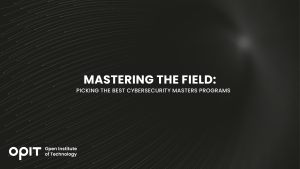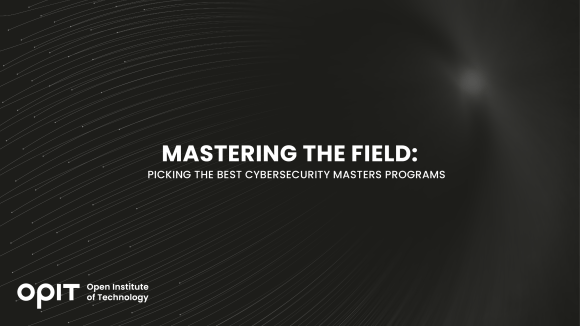

Malicious attacks on IT systems and devices are increasing in complexity and organizations need to be proactive and agile to deal with ever-evolving threats. These threats vary from ransomware attacks and the installation of malware to password theft and phishing.
Organizations want the best of the best when it comes to senior cybersecurity professionals, and demand is growing. In an increasingly competitive job market, those who have graduated from the best cybersecurity master’s programs (such as OPIT’s MSc in Enterprise Cybersecurity) will stand out from the crowd.
Exploring Cybersecurity Programs
The ever-evolving nature of threats makes a career in cybersecurity one of the most exciting in the field of IT. However, the applicant must have suitable qualifications to secure a place at a leading company.
The right program should incorporate advanced master’s level theoretical subjects and practical, experiential learning, and the courses on offer should be at the cutting edge of cybersecurity best practices. This will provide the students with the tools they need to deal with not only current cybersecurity challenges but also emerging threats.
Each qualification has core courses allowing students to choose which competencies would best fit their unique requirements. This makes deciding on the best qualification from the best cybersecurity master’s programs essential.
Criteria for the Best Cybersecurity Programs
When evaluating qualification options, it will soon become clear that the best cybersecurity programs have much to offer. But how do you assess whether your chosen program will deliver the goods regarding career opportunities?
When researching the best cybersecurity master’s programs, keep the following criteria in mind:
- Ensure that the master’s program you choose has course content applicable to your specialty and aligns with other industry certifications you may already have.
- Check if your selected qualification offers courses that balance theory with real-world application.
- Verify that the qualification provider is accredited by an internationally recognized regulatory or accreditation body.
- Make sure the program offers a flexible online study schedule.
Aside from the course offerings, services such as networking opportunities, career advisory, and post-graduate support will be invaluable for job placement opportunities – particularly institutions in partnership with leading cybersecurity firms.
Researching alumni success stories will also give you a unique insight into the program beyond the program’s overview and curriculum.
Best Cybersecurity Masters in the World
Cyber threats are global; they don’t respect borders. In light of this, the best cybersecurity masters in the world will offer a range of internationally accepted coursework, providing skills based on diverse perspectives. This is the program for those who want to build a robust network of business contacts.
Here are five top cybersecurity programs that tick all the boxes:
1. M.S. in Cybersecurity From the University of Tampa – Sykes College of Business
This program may be a good fit for those with an ever-changing schedule because they can study full-time or part-time. However, due to its flexibility, the on-campus degree will take between one and two years to complete. One of its key features is preparation for professional certifications such as the Certified Information Systems Security Professional (CISSP) exam. The program costs approximately $20,960 (about 19,380 euros) per annum.
2. Master of Science in Cybersecurity Management – Nova Southeastern University
Students will devote between one and two years to this qualification, with a mixture of distance learning and on-campus study. Fees are $950 (around 878 euros) per credit. The program focuses on vital skills such as, cybersecurity management communication, organizational policy development, compliance issue management, and risk management principles application to the real-world environment.
3. MSc in Cybersecurity and Public Policy – Tufts University School of Engineering
Coursework for this exceptional master’s qualification takes place entirely on campus, and student fees are $1,730 (approximately 1,600 euros) per credit. Students have the flexibility to complete the coursework in either one or two years. Core coursework includes privacy in the digital age, how systems work and fail, and the role of cyber in the civil sector. This course is ideal for students who want to get on the fast track to a senior management position.
4. UC Berkeley Master’s in Cybersecurity Online
This online qualification is ideal for busy professionals who may find full-time on-campus study problematic, with completion occurring in as little as 20 months. The program allows students to master foundational cybersecurity-related technical skills and speak with authority on the political, business, and legal complexities of the ever-evolving cybersecurity environment.
5. Information Technology Auditing and Cyber Security MS – Temple University Fox School of Business
As another fairly flexible program on the list, this on-campus two-year qualification can be completed full-time or part-time. The program is hands-on, with coursework delivered by industry-level experts. Students learn how to assess business needs and design the internal processes that are so important for the development of robust cybersecurity systems. The course (costing $1,165 or 1,077 euros per credit) is ideal for employment in accounting and consulting firms, computer software and hardware companies, and financial institutions.
Best Online Cybersecurity Master’s
Given the increasing cybersecurity threats that are now a business reality, the best online cybersecurity master’s degrees are in increasing demand. Accordingly, many businesses consider a qualification like this essential for senior management.
Online master’s degrees are an attractive option for the busy executive or someone searching for the ideal work/life balance. They provide accessible, interactive access to state-of-the-art digital platforms that can make studying at your own pace a pleasure. The best cybersecurity master’s programs also offer a combination of theoretical foundations and hands-on experience, all delivered remotely.
Learn more about your options for further online study by clicking on this link: best online cybersecurity programs.
OPIT’s Master’s in Enterprise Cybersecurity: A Cut Above the Rest
The Master’s Degree (MSc) in Enterprise Cybersecurity from OPIT is not only accredited but also conforms to the criteria that elevate a qualification above the standard offerings. Especially notable is the prioritization of real-time industry needs, making it the best cybersecurity master’s degree to obtain. The coursework is the ideal combination of theoretical approaches and real-world experience, all delivered via a platform that is not only easily accessible but also intuitive to use.
Enrolling in the best online cybersecurity master’s, like that from OPIT, ensures students can study at their own pace while learning from industry expert faculty members. The 12–18-month qualification is also recognized by key industry players, future-proofing cybersecurity leaders with the knowledge to implement cutting-edge security solutions and lead world-class cybersecurity initiatives.
Best Cybersecurity Master’s Programs in the USA
The United States is at the epicenter of cybersecurity innovation. This is no coincidence, as it’s home to Silicon Valley and numerous global giants in the tech industry. The demand for qualified degree holders is growing exponentially, but, once again, selecting from the top cybersecurity master’s programs in the USA can be a daunting task. Here are two well-respected options.
1. Online Master’s in Cybersecurity – Syracuse University
Live online classes and coursework that provide professionals with the knowledge required to identify, prevent, and counteract cybercrime make this master’s program one of the best cybersecurity masters programs. The program features cutting-edge research and multidisciplinary collaboration.
2. Master of Science in Cybersecurity – Marshall University
This program is ideal for students who want to pursue a Ph.D. or those who want to reach the pinnacle of their chosen profession. The curriculum covers advanced topics such as cryptography, cybersecurity policy, cyber risk and vulnerability assessment, cyber operation, and software security (among others).
Future-Proof Your Career With OPIT
The most advanced and best cybersecurity master’s programs will equip busy professionals with the specialized skills and knowledge required to thrive in an ever more competitive job market.
Online degrees such as the OPIT Master’s in Enterprise Cybersecurity should be on the bucket list of any aspirant cybersecurity expert. Dominate the field and make significant contributions to the evolution of cybersecurity best practices with OPIT‘s exemplary program.
Have questions?
Visit our FAQ page or get in touch with us!
Write us at +39 335 576 0263
Get in touch at hello@opit.com
Talk to one of our Study Advisors
We are international
We can speak in:




